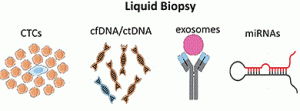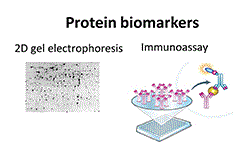Prostate Cancer
Since the one-size-fits-all approach employed in conventional medicine to deal with PCa has failed to help from patients, the demand of the hour is to create the accuracy medication approach that would assist patients in the long term.
Exosome isolation
New genomic and proteomic technology, gene editing technology, non-coding RNA diagnostics and therapeutics, and liquid tumor profiles possess the capability to exude the guarantee of precision medication, highlighting this revolution on distinct facets of cancer and their tractability into practices (Figure 1). Within this short article we discuss tools for PCa identification. Exosomal Rna contains pure mRNA and microRNAs that are cleaner, easier to harvest and more reproducible than total Rnas.

Figure 1
The use of Hitachi unique mRNA extraction from Exosomes kits will is available for active surveillance for significantly less competitive PCa to surgery and radiation for advanced disease.
Androgen deprivation therapy (ADT) is currently the principal antihormone therapy for treating advanced PCa. Aside from the initial effectiveness of ADT, many patients with advanced PCa finally develop immunity for this treatment and advancement into castrate-resistant PCa (CRPC) (7). Antiandrogen medications like enzalutamide, abiraterone, and apalutamide happen to be Food and Drug Administration (FDA)-approved second production treatments, which has improved survival of CRPC sufferers (metastatic and localized). Alternately, chemotherapy presents a feasible choice for treating metastatic PCa, and it has appeared to improve survival rate in comparison with ADT .
The conventional chemotherapy agent, docetaxel, was utilized primarily until cabazitaxel has been approved in 2010 for CRPC sufferers.
Regardless of these permanent remedies, bulk of the cases don’t respond to initial treatment as a result of elastic resistance, induction of immunosuppressive pathways inside the tumor, leading to tumor relapse.
An esophageal cancer mobile vaccine, sipuleucel-T, has been marginally beneficial for greater survival for patients with advanced PCa.

Immunotherapy clinical trials for patients with PCa are anticipating results and penalized.
Prostate cancer (PCa) is the next commonly diagnosed cancer (after skin cancer) from the Western culture. In 2018, globally there have been 1.3 million new patients diagnosed with PCa.
. The use of both biomarkers for detection PCa screening, and prediction have changed management and the identification of this disease. The introduction of all prostate-specific antigen (PSA) test in clinical practice has assured early identification and decreased mortality in PCa (two ). Regardless of its worth for PCa detection, PSA as a test has a few constraints. The PSA test has a specificity and sensitivity ranging from 20 to 40 percent and 70 to 90 percent, respectively, determined by the implemented cutoff for PSA levels (PSA > 4 ng/ml as ordinary ).
1 explanation for the specificity of the PSA blood test is all that the PSA level may be escalated by a few causes . By way of instance, benign prostate hyperplasia (BPH) and prostatitis can result in an elevation in PSA levels, and there’s not much evidence to imply that BPH and prostatitis will grow into PCa.
Researchers and clinicians are still debating about the usage of one PSA test vs. regular non-screening clinics on PCa mortality. A recent analysis called as cluster randomized trial of PSA testing for PCa (CAP) has been conducted at the united kingdom including 419,582 guys in 50–69 age range.
The results indicated no substantial difference in PCa mortality of men screened for PSA vs. non-screened patients following a median followup of 10 decades, but increased premature phase low-risk PCa detection. The methods of discovering PCa are currently altering to enhance PCa detection. Consequently, despite significant advances in the quest of PCa biomarkers, few guys are overdiagnosed with inert PCa, while some are missed, creating the invasive disease and diagnosed at a late phase (two ).
Introduction
Prostate cancer is the second most frequent male cancer impacting Western society. Despite improvements in the quest of treatment plans and prostate cancer biomarkers, men are more than diagnosed with prostate cancer that was adrenal, despite the fact that a mortality is in the disease that was invasive. Precision medicine is therapy profiles over cancers calling treatments for cancer patients’ direction. With plans including genomic targeting and profiling cancer pathways that are specific, accuracy medication for prostate cancer has the capacity to inflict changes in treatments. A number of the improvements in prostate cancer accuracy medication contain targeting genome editing programs gene fusions RNA biomarkers, and also the guarantee of tumor profiling. Within this review, we’ll talk about these scientific improvements to scale up these strategies and endeavors to conquer obstacles .
Multiple studies have discussed the function of clinically important mutations, in addition to the amount of tumor heterogeneity in prostate cancers.
Genetic tools developed within this”genetic revolutionary” age are used to comprehend that this heterogeneity in PCa tumors and also establish the best cure for patients; new technologies such as genetic profiling and application of poly-(adenosine diphosphate) [ADP]-ribose polymerase (PARP) inhibitors such as olaparib for individuals with mutations at DNA damage response genes are a blessing for exact and efficient extrapolation of treatments for human cancer patients (15). A phase II study by Mateo et al. at CRPC patients, clarified a heightened reaction of PARP inhibitors for patients with mutations (somatic and germline) in DNA repair genes (16). Enhanced technologies have discovered germline and somatic institutions with cancer risk identifying goals and alterations in subset of individuals. They confirmed the existence of BRCA mutations in competitive phenotype, with poor survival results (19). The group researched the impact of BRCA mutations in therapy results such as 67 BRCA mutation carriers in a cohort of 1,302 PCa patients. The results suggested that BRCA carrier patients undergoing radiotherapy or prostatectomy had shorter survival and developed metastasis earlier than the non-carriers (20). A recent study identified a germline BRCA2 mutation (c.4211C p G) at a Chinese patient treated with ADT and radiotherapy, the mutation leading to a truncated protein.
- OncoTag M Research group, Seoul Corea
- Hitachi exosome Researh Center, USA, Ca
- School of Biomedical Sciences, Queensland University of Technology, Institute of Health and Biomedical Innovation, Brisbane, QLD, Australia
- Australian Prostate Cancer Research Centre–Queensland, Translational Research Institute, Woolloongabba, QLD, Australia